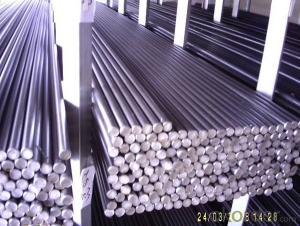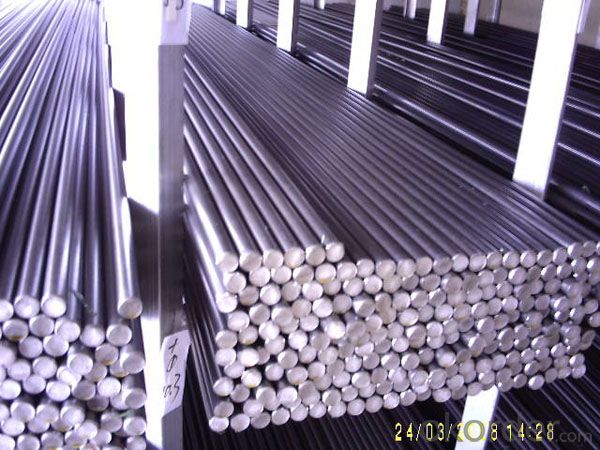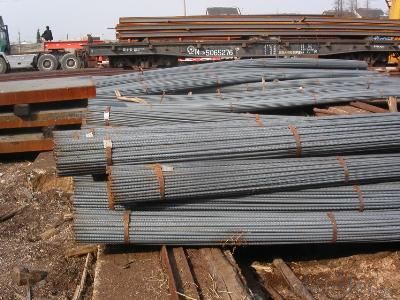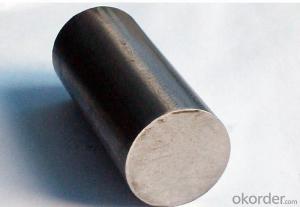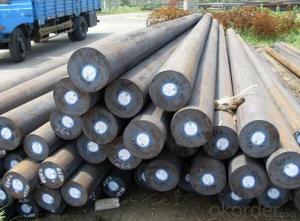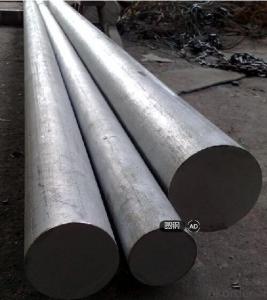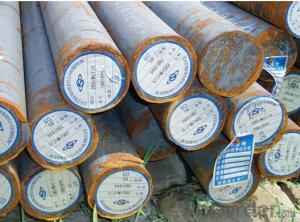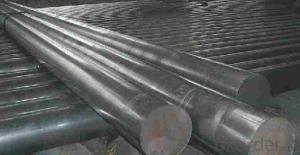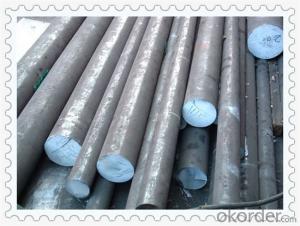Annealed,Hot Rolled&Forged 4130 Alloy Steel Bar
- Loading Port:
- China main port
- Payment Terms:
- TT OR LC
- Min Order Qty:
- 25 m.t.
- Supply Capability:
- 10000 m.t./month
OKorder Service Pledge
OKorder Financial Service
You Might Also Like
Specification
Annealed,Hot Rolled&Forged 4130 Alloy Steel Bar
Material: | AISI 4130 Alloy Steel | |||||||||
Diameter | 6mm ~800mm or at your requirements | |||||||||
Length | 1m~12m or at your requirements | |||||||||
tolerance | a) Diameter: +/-0. 15mm or the others | |||||||||
b) Length:+/-4. 5mm or the others | ||||||||||
surface | black or turned | |||||||||
test | Squash test, Extended test, Water pressure test, Crystal rot test, Heat treatment, NDT. | |||||||||
Mechanical Property | Tensile Strength | ≥ (440~1470) | ||||||||
Yield Strength | ≥(255~1330) | |||||||||
Extension | ≥ (7%~24%) | |||||||||
Reduction of cross-section | ≥ (35%~60%) | |||||||||
Impact absorbing energy | ≥ (31~110) | |||||||||
Hardness (HBS) | ≤ (179~269) | |||||||||
Payment term | T/T L/C or we can negotiate it. | |||||||||
Delivery condition | EAF + LF + VD, hot rolled/forged/ Heat Treatment(optional), | |||||||||
Trade term | FOB/CFR/CIF | |||||||||
Delivery time | have stocks | |||||||||
Packagements | According to customers' requirements or export's demands | |||||||||
Port | Shenzhen/Guangzhou | |||||||||
MOQ | 100 Kilogrammes | |||||||||
Character
| 1,high strength and hardenability 4,good combination property 5,high quality and competitive price. | |||||||||
Application | made into ships, vehicle, aircraft, missile,weapons,railways,bridge,pressure vessel, machine tool,gears in gearbox, gear shaft, cam, worm, claw clutch, etc. | |||||||||
Products | Our products mainly cover special steel,including stainless steel, tool steel, die steel, bearing steel,etc. And in shapes, we provide steel round bar, steel square bar,steel flat bar, steel plate, steel sheet, steel coil, steel wire, ans steel pipe.Being the top-class products in China,our products have been used in all kinds of fields,such as aerospace, electronic information, machine manufacture,petrochemical,automotive,communication, transportation and medical instruments, etc. Our products are sold all over the world , mainly in Asia, South America, and Africa.
| |||||||||
Product show:

Workshop show:

FAQ:
1, Your advantages?
professional products inquiry, products knowledge train (for agents), smooth goods delivery, excellent customer solution proposale
2, Test & Certificate?
SGS test is available, customer inspection before shipping is welcome, third party inspection is no problem
3, Payment Terms?
30% TT as deposit and 70% before delivery.
Irrevocable L/C at sight.
4, Trading Terms?
EXW, FOB, CIF, FFR, CNF
5, After-sale Service?
We provides the services and support you need for every step of our cooperation. We're the business partner you can trust.
For any problem, please kindly contact us at any your convenient time.
We'll reply you in our first priority within 24 hours.
- Q: How does special steel contribute to improving product safety in high-risk industries?
- Special steel plays a crucial role in enhancing product safety in high-risk industries due to its unique properties. Its exceptional strength, durability, and resistance to corrosion and wear make it ideal for manufacturing critical components in sectors like aerospace, automotive, and energy. By using special steel, manufacturers can ensure that their products can withstand extreme conditions, reducing the risk of failure or malfunction. This, in turn, enhances the safety of the end-users and prevents potential accidents or disasters in high-risk industries.
- Q: Can special steel be used for manufacturing tools?
- Yes, special steel can be used for manufacturing tools. Special steel is often preferred for tool production as it offers superior strength, durability, and resistance to wear and tear. It also allows for the creation of tools with specific properties, such as high heat resistance or corrosion resistance, making it suitable for various applications in industries like automotive, aerospace, and construction.
- Q: What are the challenges in forging special steel?
- Forging special steel presents several challenges, including selecting the appropriate alloy composition, achieving the desired mechanical properties, and maintaining dimensional accuracy during the forging process. Additionally, special steels often have higher carbon content and alloying elements, making them more prone to cracking, distortion, and heat treatment issues. Controlling the heating and cooling rates, as well as precise temperature management, is crucial to avoid defects and ensure uniformity. Furthermore, the intricate shapes and complex geometries of special steel components require skilled craftsmanship and sophisticated forging techniques to achieve the desired final product quality.
- Q: How does special steel contribute to reducing weight in applications?
- Special steel can contribute to reducing weight in applications in several ways. Firstly, special steel alloys can be designed to have high strength-to-weight ratios, meaning that they can provide the same level of strength and performance as other materials, such as traditional steel or aluminum, but with less weight. By using special steel in place of heavier materials, manufacturers can reduce the overall weight of the application without compromising its structural integrity. Additionally, special steel can be manufactured with improved fatigue resistance and durability properties, which allows for the use of thinner and lighter sections without sacrificing strength. This is particularly important in industries where weight reduction is critical, such as automotive and aerospace, as it enables the production of lighter vehicles or aircraft, resulting in improved fuel efficiency and reduced emissions. Furthermore, special steel can also contribute to weight reduction through its versatility in manufacturing processes. It can be easily formed, shaped, and welded, allowing for the creation of complex and lightweight structures. This flexibility in fabrication methods allows engineers to optimize the design and maximize weight savings by using special steel in innovative ways. In summary, special steel contributes to reducing weight in applications by offering high strength-to-weight ratios, improved fatigue resistance, and durability, as well as providing flexibility in manufacturing processes. These qualities make special steel an ideal choice for industries seeking weight reduction, ultimately leading to enhanced performance, efficiency, and sustainability.
- Q: What are the different methods of testing the quality of special steel?
- There are several methods used to test the quality of special steel. 1. Chemical Analysis: This method involves analyzing the composition of the steel to ensure it meets the required chemical specifications. It helps determine the presence and quantity of various elements, such as carbon, manganese, chromium, nickel, and others, which are crucial for achieving specific mechanical properties. 2. Mechanical Testing: Mechanical testing is performed to evaluate the strength, hardness, ductility, and other mechanical properties of special steel. Common tests include tensile testing, which measures the steel's resistance to breaking under tension, and hardness testing, which determines its resistance to indentation or scratching. 3. Non-Destructive Testing (NDT): NDT methods are employed to assess the quality of steel without causing damage. Techniques such as ultrasonic testing, magnetic particle testing, and liquid penetrant testing are used to detect surface and internal defects, cracks, or discontinuities that may affect the steel's integrity. 4. Microscopic Examination: Microscopy is used to examine the microstructure of special steel, allowing for the evaluation of grain size, inclusions, and other structural features. This analysis can provide insights into the steel's properties and potential defects. 5. Corrosion Testing: Special steel often needs to resist corrosion in harsh environments. Various corrosion tests, such as salt spray testing, electrochemical methods, and exposure to corrosive substances, are conducted to assess the steel's resistance to corrosion and determine its suitability for specific applications. 6. Impact Testing: This method involves subjecting the steel to a high-energy impact to assess its toughness and resistance to sudden loading. It helps determine if the steel can withstand sudden shocks or impacts without fracturing. 7. Heat Treatment Analysis: Special steel often undergoes heat treatment processes to enhance its properties. Heat treatment analysis involves examining the microstructure and hardness of the steel after the treatment to ensure it has achieved the desired properties. Overall, the combination of these testing methods helps ensure that special steel meets the required quality standards, ensuring its suitability for various applications, such as construction, automotive, aerospace, and industrial equipment.
- Q: How does special steel withstand high-velocity impacts?
- Special steel is able to withstand high-velocity impacts due to its exceptional strength and toughness. It is specifically engineered to have enhanced mechanical properties, such as increased hardness and resistance to deformation. This allows the steel to absorb and distribute the energy from the impact, minimizing the risk of fractures or failure. Additionally, special steel may be heat-treated or alloyed with other elements to further improve its impact resistance, making it an ideal choice for applications where high-velocity impacts are a concern.
- Q: What are the different types of special steel coatings?
- Various special steel coatings exist to enhance the properties and performance of steel. Some commonly used types include: 1. Galvanized Coatings: These coatings involve applying a layer of zinc to the steel surface. Galvanized coatings provide excellent corrosion resistance, making them suitable for outdoor applications and structures exposed to harsh environments. 2. Epoxy Coatings: Known for their exceptional durability and chemical resistance, epoxy coatings protect steel from corrosion, abrasion, and chemical exposure. They can be single or multi-layer systems, extending the steel's lifespan and performance. 3. Powder Coatings: Powder coatings, applied electrostatically and cured under heat, offer excellent protection against corrosion, impact, and UV damage. They come in various colors and finishes, making them popular for aesthetic purposes. 4. Thermal Spray Coatings: These coatings involve applying molten particles onto the steel surface using a thermal spray gun. Ceramic coatings are the most common type, providing enhanced wear resistance, thermal insulation, and corrosion protection. 5. PVD Coatings: Physical Vapor Deposition (PVD) coatings deposit thin layers of metallic or ceramic materials onto the steel surface through vaporization. PVD coatings improve hardness, wear resistance, and reduce friction. 6. Organic Coatings: Polyurethane or acrylic coatings, known as organic coatings, protect against corrosion, UV damage, and chemical exposure. They are commonly used in architecture, automotive parts, and industrial equipment. 7. Chrome Plating: Chrome plating involves depositing a layer of chromium onto the steel surface. This coating offers excellent corrosion resistance, hardness, and a decorative finish. It is often used in automotive applications and for decorative purposes. Selecting the appropriate special steel coating is crucial, considering the specific requirements of the steel component or structure, including corrosion resistance, durability, aesthetics, and environmental factors.
- Q: How does special steel contribute to the food processing aftermarket industry?
- The food processing aftermarket industry greatly benefits from the use of special steel, as it offers a multitude of advantages that enhance overall efficiency, safety, and productivity. To begin with, special steel is renowned for its remarkable resistance to corrosion. This is particularly crucial in the food processing industry, where equipment frequently encounters acidic and corrosive substances. By utilizing special steel, machinery remains impervious to rust and contamination. As a result, the hygiene and quality standards of food processing operations are maintained, thereby reducing the risk of foodborne illnesses and contamination. Moreover, special steel exhibits exceptional strength and durability, enabling food processing equipment to withstand the demanding conditions of heavy usage and continuous operations. The robustness of special steel ensures the reliability of equipment, minimizing the likelihood of breakdowns or malfunctions during critical production processes. Consequently, operational efficiency is increased, downtime is reduced, and production output is improved. Furthermore, special steel can be customized to suit specific applications, allowing manufacturers to design and produce equipment that meets the unique requirements of the food processing industry. Special steel alloys can be tailored to possess specific properties, such as heat resistance, wear resistance, or hardness, depending on the specific processing needs. This adaptability guarantees that equipment can handle different types of food products, processing techniques, and operating conditions, resulting in enhanced versatility and adaptability within the food processing aftermarket industry. Additionally, special steel is compatible with various cleaning and sterilization processes, making it ideal for food processing equipment. The material can endure high-temperature cleaning methods, such as steam or chemical cleaning, without deteriorating or compromising its structural integrity. This ease of cleaning and sterilization contributes to maintaining the highest standards of hygiene and sanitation within the food processing industry. In conclusion, special steel's resistance to corrosion, strength, durability, customization options, and compatibility with cleaning processes make it an invaluable material within the food processing aftermarket industry. Its contribution to equipment reliability, hygiene, and productivity ensures that food processing operations can meet the stringent quality and safety standards required in this sector.
- Q: What are the different methods of surface pickling for special steel?
- Pickling special steel can be achieved through various methods. These methods comprise acid pickling, electrolytic pickling, mechanical pickling, and passivation. The most commonly employed method for pickling special steel is acid pickling. It entails immersing the steel in an acid solution, typically hydrochloric acid or sulfuric acid, to eliminate any surface impurities. By reacting with the steel's oxide layer, the acid dissolves it, leaving a pristine surface. Electrolytic pickling, on the other hand, involves passing an electric current through the steel submerged in an electrolyte solution. This creates a chemical reaction that removes surface impurities. Electrolytic pickling offers better control and enables a more consistent surface finish compared to acid pickling. Mechanical pickling utilizes abrasive materials like sandpaper or wire brushes to physically scrub the steel's surface and eliminate any scale or rust. It is often combined with acid or electrolytic pickling to achieve the desired surface finish. After pickling, special steel can undergo passivation to enhance its corrosion resistance. Passivation entails treating the steel with a chemical solution, typically nitric acid or citric acid, to form a protective oxide layer on the surface. This layer prevents further corrosion and enhances the steel's overall durability. It's worth mentioning that the specific method of surface pickling for special steel may vary depending on factors such as the type of steel, desired surface finish, and intended application. Therefore, it is essential to consult experts or adhere to the manufacturer's guidelines to ensure the appropriate pickling method is employed for special steel.
- Q: How is maraging steel used in the production of rocket and missile components?
- Maraging steel is utilized in the manufacturing of rocket and missile components due to its exceptional strength, toughness, and resistance to fatigue and stress. Its unique properties make it ideal for critical parts such as pressure vessels, casings, nozzles, and structural elements, where high-performance materials are required to withstand extreme conditions during launch and flight. Maraging steel's ability to maintain its integrity under intense heat, pressure, and vibrations makes it a crucial material for ensuring the reliability and safety of rocket and missile systems.
Send your message to us
Annealed,Hot Rolled&Forged 4130 Alloy Steel Bar
- Loading Port:
- China main port
- Payment Terms:
- TT OR LC
- Min Order Qty:
- 25 m.t.
- Supply Capability:
- 10000 m.t./month
OKorder Service Pledge
OKorder Financial Service
Similar products
Hot products
Hot Searches
Related keywords
